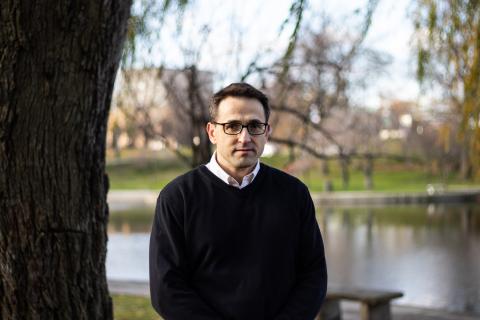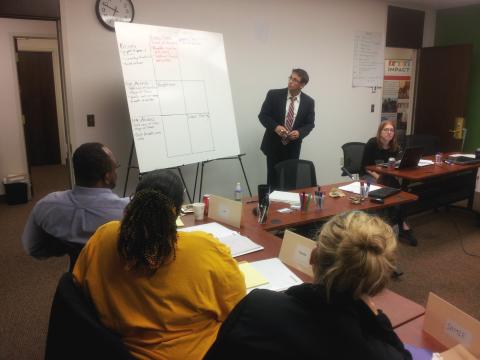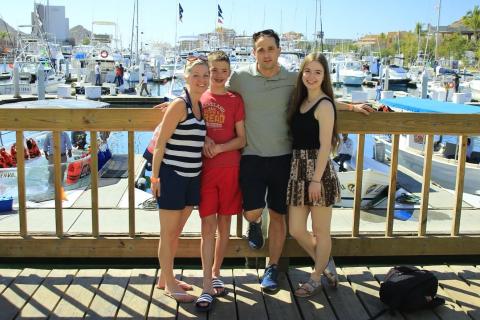An Advocate at Heart, Actionability is a Cornerstone of Rose’s Research Program
This article is a part of our Health Disparities Researcher Feature series.
Dr. Johnie Rose didn’t grow up wanting to be a scientist. His interest in policy and quantitative analysis led him to study economics in college. Working in the health insurance industry before going to medical school and earning a PhD in Epidemiology and Biostatistics from Case Western Reserve University allowed him to exercise his strengths, but the decision to use data for good in a different way came to him organically. Dr. Rose is currently Program Director Preventive Medicine Residency Program, Assistant Professor, Center for Community Health Integration, and Assistant Professor, Department of Population and Quantitative Health Sciences at the School of Medicine, Case Western Reserve University, as well as a Member of the Population and Cancer Prevention Program at Case Comprehensive Cancer Center.
“I had a lot of great mentors who helped me evolve my interest in working with data and doing computer simulations,” Dr. Rose said. Dr. Rose first delved deeply into health disparities research with his mentor and colleague, Siran Koroukian, PhD. “Being able to shine a light on unfair differences, and being able to help identify causes and potential solutions is what makes health disparities research most rewarding,” Dr. Rose exclaimed. “I’ve always had an eye for what’s unfair in the world. Society makes judgments about certain groups of people while they are systematically taken advantage of in service of a system that oppresses them,” Dr. Rose added.
Running toward fires instead of away from them, Dr. Rose finds one of the most challenging (and exciting) parts of health disparities research to be, “moving beyond mere description and documentation of disparities toward translation and action.” Translation needs to happen more quickly so that researchers and advocates can really understand what can be done to intervene. Dr. Rose explained the divide between people who are experts in science and people who are experts on the lived experiences of underserved populations (i.e., people who live in and work grassroots with communities). “People who work directly with underserved communities understand why residents don’t get screened and why they don’t trust the system. We need to partner with these real experts and bring our technical and data expertise to understand the entire picture of the problem and potential solutions together,” Dr. Rose proclaimed.
Dr. Rose’s commitment to community collaboration is evident in the creation of a prototype data infrastructure, titled OH-Case (Ohio Cancer Assessment and Surveillance Engine) whose development he has led. It is a powerful research tool that also features a “user-friendly” interface for quick queries by non-researchers. OH-CASE includes community-level information about not only cancer burden but also healthcare access, risk environment, demographics, and socioeconomics–a research tool that can put actionable data into the hands of people who work in and know the community. OH-Case provides accurate information to help focus both research and outreach.
“As a white male, especially one growing up in the south, society has always given me the benefit of the doubt,” replied Dr. Rose when asked what diversity, equity, and inclusion means to him. He continued, “It means having the empathy to get mad on others’ behalf. When you see a system or practice that is fundamentally racist, doing your job to point it out and try to do something about it honors the humanity of other groups. This, to me, is what it means to be anti-racist,” Dr. Rose added.
Dr. Johnie Rose received support from the CTSC in 2017 for two pilot grants. One of the pilot awards helped fund informatics work in support of modeling work around colorectal cancer. That pilot led to receipt of an American Cancer Society award and novel research. The other annual pilot award helped Dr. Rose start OH-Case.
Fast Five
- Favorite thing to do in Northeast Ohio: I love being outside here in the warm weather months. This low humidity, sub-90 summer is glorious to me. Anything outside.
- Favorite research innovation: The evolution of machine learning methodologies over recent decades and their increasing use in health-related and health disparities research.
- Favorite restaurant: Batuqui - a Brazilian eatery on Larchmere.
- Favorite place to go in Northeast Ohio: The lake. I like to sail.
- If I wasn’t a researcher, I’d be an…engineer.




